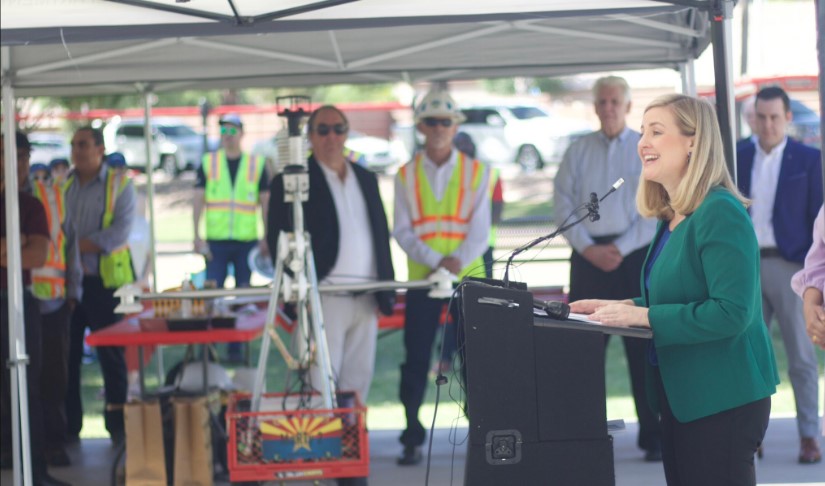By Corinne Murdock |
The city of Phoenix’s “cool” pavement is making people hotter, something the city learned from their pilot program study with Arizona State University (ASU) — but chose to prioritize its sustainability goals to combat climate change instead.
The 2021 joint study discovered that the “cool” pavement makes people feel up to six degrees hotter: the material deflects sunlight, causing people to absorb it. The study declared the increased human discomfort a “necessary tradeoff” for reducing the temperature of city infrastructure.
The study not only reported negative physical impacts resulting from the pavement; survey respondents also relayed negative feelings about the aesthetics, safety, and durability of the pavement. Residents reported that the pavement was “blinding” due to its light color, and that the tire and oil marks stained the pavement in ugly ways. They also reported the pavement being slick, and even wearing off at a fast rate.
It appears that ASU researchers and Phoenix leaders were aware even prior to the study that the cool pavement would make people hotter. At the start of the pilot program, ASU professor David Sailor revealed that the same material was planned for use in the 2020 Summer Olympics marathon route in Japan, but that the material would likely make the runners hotter due to the solar reflection.
Despite the report indicating overall negative impacts to the human body and resident sentiments, the city decided to make the pavement program permanent. Since 2019, the city has spent over $12 million per Arizona’s Family.
The city announced last month that it installed over 100 miles of the cool pavement.
While the city increases the coverage of pavement making people hotter, public health officials have been warning residents of the consequences of long-term exposure to record summer heat.
In marketing their initiative, city leaders have pointed out that the pavement makes the ground 10-12 degrees cooler. While that may be true, the 2021 Phoenix-ASU report revealed that the surfaces cool by deflecting half of that heat to people.
Despite the 2021 report, city leaders claim that the material makes people feel cooler. Phoenix Mayor Kate Gallego claimed the pavement makes the city more “comfortable.”
Cool pavement has also presented an opportunity for city leaders to market Phoenix as innovative in terms of sustainability efforts, namely with energy usage. Gallego has cited the city’s membership with C40 Cities, a progressive climate change organization on whose steering committee Gallego sits as vice chair, as the driving force behind cool pavement.
Sailor, one of the ASU researchers, projected in a 2020 interview during the ASU-Phoenix pilot program that the technology would save ratepayers up to $75 million per degree in energy costs.
Another researcher on the study, ASU professor David Hondula, was named director of the office overseeing the pavement initiative within weeks of the study’s publication.
The California-based manufacturer for the pavement material, GuardTop, opened its downtown Phoenix facility to create the product in 2017. Since 2022, after Phoenix made its pavement initiative permanent, the company has exclusively produced the material at its Phoenix facility, naming it “Phoenix Gray.” Australia, Canada, Singapore, and the United Arab Emirates have purchased the cool pavement material from the company.
GuardTop’s founder and CEO, Bob Koleas, is an alumnus of the University of Arizona.
Corinne Murdock is a reporter for AZ Free News. Follow her latest on Twitter, or email tips to corinne@azfreenews.com.








